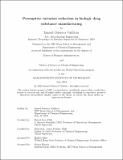| dc.contributor.advisor | Jones Prather, Kristala L. | |
| dc.contributor.advisor | Levi, Retsef | |
| dc.contributor.author | Güereca Valdivia, Ismael | |
| dc.date.accessioned | 2024-08-12T14:13:04Z | |
| dc.date.available | 2024-08-12T14:13:04Z | |
| dc.date.issued | 2024-05 | |
| dc.date.submitted | 2024-06-25T18:12:19.105Z | |
| dc.identifier.uri | https://hdl.handle.net/1721.1/155982 | |
| dc.description.abstract | Biomanufacturing processes are characterized by their high natural complexity and variability, which present significant challenges to achieving consistent product quality and operational efficiency. This thesis proposes that integrating digital twins and soft sensors into these processes can substantially improve decision-making workflows. By simulating the biomanufacturing process and enabling real-time monitoring and estimation of critical parameters, organizations can reduce emerging variations in their manufacturing process by being able to identify, predict, and mitigate emerging issues before they become disruptive.To validate this hypothesis, a digital twin for a generic Integrated Continuous Bioreactor (ICB) operation was developed based on first principles. Additionally, soft sensors were used for the real-time estimation of biomass concentration (a critical parameter in mammalian cell culture). Combining mechanistic and data-driven modeling approaches and leveraging historical production data from Sanofi’s operations, both approaches were built and tested, demonstrating their effectiveness in real-world scenarios. The results show the potential of these technologies in improving process monitoring and control. On the one hand, the digital twin of the ICB operation allowed for the simulation of various scenarios, which presents the opportunity to adjust the parameters to ensure adequate operating conditions. On the other hand, implementing soft sensors, utilizing multiple linear regression and Seasonal Autoregressive Integrated Moving-Average (SARIMAX) models accomplished precise real-time estimations of biomass concentration. Both results validate the optimization of large-scale biomanufacturing processes by highlighting the potential of digital twins and soft sensors in reducing variation and driving continuous improvement. | |
| dc.publisher | Massachusetts Institute of Technology | |
| dc.rights | In Copyright - Educational Use Permitted | |
| dc.rights | Copyright retained by author(s) | |
| dc.rights.uri | https://rightsstatements.org/page/InC-EDU/1.0/ | |
| dc.title | Preemptive variation reduction in biologic drug substance manufacturing | |
| dc.type | Thesis | |
| dc.description.degree | S.M. | |
| dc.description.degree | M.B.A. | |
| dc.contributor.department | Massachusetts Institute of Technology. Department of Chemical Engineering | |
| dc.contributor.department | Sloan School of Management | |
| mit.thesis.degree | Master | |
| thesis.degree.name | Master of Science in Chemical Engineering | |
| thesis.degree.name | Master of Business Administration | |
